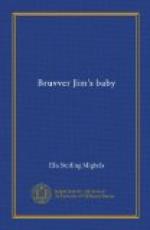“Give us the ketch-and-kin-ketch-as-you-kin,” responded the spokesman.
“Mebbe we ought to begin with Sunday-school,” suggested the blacksmith. “That would sort of get us ready for the real she-bang.”
“How do you do it?” inquired Lufkins, the teamster.
“Oh, it’s just mostly catechism,” Jim imparted, sagely.
“And what’s catechism?” said Bone.
“Catechism,” drawled the miner, “is where you ask a lot of questions that only the children can answer.”
“I know,” responded the blacksmith, squatting down before the anvil. “Little Skeezucks, who made you?”
The quaint little fellow looked at the brawny man timidly. How pale, how wee he appeared in all that company, as he sat on the great lump of iron, solemnly winking his big, brown eyes and clinging to his make-shift of a doll!
“Aw, say, give him something easy,” said Lufkins.
“That’s what they used to bang at me,” said the smith, defending his position. “But I’ll ask him the easiest one of the lot. Baby boy,” he said, in a gentle way of his own, “who is it makes everything?—who makes all the lovely things in the world?”
Shyly the tiny man leaned back on the arm he felt he knew, and gravely, to the utter astonishment of the big, rough men, in his sweet baby utterance, he said:
“Bruv-ver—Jim.”
A roar of laughter instantly followed, giving the youngster a start that almost shook him from his seat.
“By jinks!” said Keno. “That’s all right. You bet he knows.”
But the Sunday-school programme was not again attempted. When something like calm had settled once more on the audience, If-only Jim remarked that he guessed they would have to quit their fooling and get down to the business of church.
CHAPTER VII
THE SUNDAY HAPPENINGS
But to open the service when quiet reigned again and expectation was once more concentrated upon him afforded something of a poser still to the lanky old Jim, elected to perform the offices of leading.
“Where’s Shorty Hobb with his fiddle?” said he.
“Parky wouldn’t leave him come,” answered Bone. “He loaned him money on his vierlin, and he says he owns it and won’t leave him play in no church that ever got invented.”
“Parky, hey?” said Jim, drawlingly. “Wal, bless his little home’pathic pill of a soul!”
“He says he’s fed more poor and done more fer charity than any man in town,” informed a voice.
“Does, hey?” said the miner. “I’ll bet his belly’s the only poor thing he feeds regular. His hand ain’t got callous cutting bread for the orphans. But he ain’t a subject for church. If only I’d ‘a’ known what he was agoin’ to do I’d made a harp. But let it go. We’ll start off with roll-call and follow that up with a song.”
He therefore began with the name of Webber, who responded “Here,” and proceeding to note who was present, he drawled the name or familiar sobriquet of each in turn, till all had admitted they were personally in attendance.




